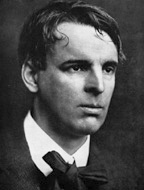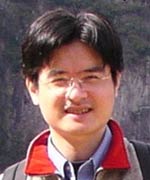
William Butler Yeats
叶芝
  William Butler Yeats was born in Dublin, Ireland, in 1865. He is one of the most influential Irish poet and playwrite. He was awarded the Nobel prize for literature in 1923 and died in 1939 at the age of 73. William Butler Yeats was born in Dublin, Ireland, in 1865. He is one of the most influential Irish poet and playwrite. He was awarded the Nobel prize for literature in 1923 and died in 1939 at the age of 73.
叶芝(1865-1939), 爱尔兰诗人和剧作家, 1923年度诺贝尔文学奖获得者。1865年出生于都柏林画师家庭。代表作有诗剧《胡里痕的凯瑟琳》(1902)、《1916年的复活节》(1921)等。1939年于法国去世。
|

|

译者
Translator
Edgar Dive
戴玨
Edgar Dive studied at the London School of Economics and the Australian National University. He now lives in Hong Kong.
 
戴玨,伦敦经济学院和澳洲国立大学毕业。现居于香港。
|
A doll in the doll-maker's house
Looks at the cradle and bawls:
'That is an insult to us.'
But the oldest of all the dolls
Who had seen, being kept for show,
Generations of his sort,
Out-screams the whole shelf: 'Although
There's not a man can report
Evil of this place,
The man and the woman bring
Hither, to our disgrace,
A noisy and filthy thing.'
Hearing him groan and stretch
The doll-maker's wife is aware
Her husband has heard the wretch,
And crouched by the arm of his chair,
She murmurs into his ear,
Head upon shoulder leant:
'My dear, my dear, oh dear,
It was an accident.
|
|
玩偶匠屋里的一个玩偶
看着摇篮大声哭诉:
“这是对我们的侮辱。”
可是最年长的玩偶,
因被留作样品,见过
几代同类,他的尖叫
盖过了整个架子:“虽说
没人能够举报
此地的罪恶,
那对男女竟把个
又吵又脏的东西带到这儿,
丢尽了我们的脸。”
听到他咕哝又伸懒腰,
玩偶匠的妻子意识到
她丈夫听见了那坏蛋的话,
于是在他的座椅扶手旁蹲下,
头倚着他的肩,
对着他的耳朵低声叨念:
“亲爱的,亲爱的,哎呀,
那可是意外啊。”
|
Midnight has come and the great Christ Church bell
And many a lesser bell sound through the room;
And it is All Souls' Night.
And two long glasses brimmed with muscatel
Bubble upon the table. A ghost may come;
For it is a ghost's right,
His element is so fine
Being sharpened by his death,
To drink from the wine-breath
While our gross palates drink from the whole wine.
I need some mind that, if the cannon sound
From every quarter of the world, can stay
Wound in mind's pondering,
As mummies in the mummy-cloth are wound;
Because I have a marvellous thing to say,
A certain marvellous thing
None but the living mock,
Though not for sober ear;
It may be all that hear
Should laugh and weep an hour upon the clock.
Horton's the first I call. He loved strange thought
And knew that sweet extremity of pride
That's called platonic love,
And that to such a pitch of passion wrought
Nothing could bring him, when his lady died,
Anodyne for his love.
Words were but wasted breath;
One dear hope had he:
The inclemency
Of that or the next winter would be death.
Two thoughts were so mixed up I could not tell
Whether of her or God he thought the most,
But think that his mind's eye,
When upward turned, on one sole image fell;
And that a slight companionable ghost,
Wild with divinity,
Had so lit up the whole
Immense miraculous house
The Bible promised us,
It seemed a gold-fish swimming in a bowl.
On Florence Emery I call the next,
Who finding the first wrinkles on a face
Admired and beautiful,
And by foreknowledge of the future vexed;
Diminished beauty, multiplied commonplace;
Preferred to teach a school
Away from neighbour or friend,
Among dark skins, and there
Permit foul years to wear
Hidden from eyesight to the unnoticed end.
Before that end much had she ravelled out
From a discourse in figurative speech
By some learned Indian
On the soul's journey. How it is whirled about
Wherever the orbit of the moon can reach,
Until it plunge into the sun;
And there, free and yet fast,
Being both Chance and Choice,
Forget its broken toys
And sink into its own delight at last.
I call MacGregor Mathers from his grave,
For in my first hard spring-time we were friends,
Although of late estranged.
I thought him half a lunatic, half knave,
And told him so, but friendship never ends;
And what if mind seem changed,
And it seem changed with the mind,
When thoughts rise up unbid
On generous things that he did
And I grow half contented to be blind!
He had much industry at setting out,
Much boisterous courage, before loneliness
Had driven him crazed;
For meditations upon unknown thought
Make human intercourse grow less and less;
They are neither paid nor praised.
But he'd object to the host,
The glass because my glass;
A ghost-lover he was
And may have grown more arrogant being a ghost.
But names are nothing. What matter who it be,
So that his elements have grown so fine
The fume of muscatel
Can give his sharpened palate ecstasy
No living man can drink from the whole wine.
I have mummy truths to tell
Whereat the living mock,
Though not for sober ear,
For maybe all that hear
Should laugh and weep an hour upon the clock.
Such thought — such thought have I that hold it tight
Till meditation master all its parts,
Nothing can stay my glance
Until that glance run in the world's despite
To where the damned have howled away their hearts,
And where the blessed dance;
Such thought, that in it bound
I need no other thing,
Wound in mind's wandering
As mummies in the mummy-cloth are wound.
Oxford, autumn 1920
|
|
午夜降临,基督教堂学院3的大钟
还有许多小钟,响彻
房间;这是万灵节之夜。
桌上两个长脚玻璃盅
注满了麝香葡萄酒,泛着
泡沫。某个鬼魂大约
会来;因为,一个鬼魂经过了死的磨砺,
其构成元素变得如斯精细,当我们
的肉颚吞咽着酒浆的整体,那鬼魂
有权饮用酒的气息。
我需要一个心灵,即使
大炮从世界每个角落
响起,也能裹在沉思中的
那种,就像木乃伊
被裹在尸布中那样;因为我
有一件奇事要说,一件只有活人才会嘲笑的
奇特的事,
虽不是要说给清醒的
耳朵听;也许所有听到的
都会又笑又哭一个小时。
我首先召唤霍顿。他爱怪诞的观念,
他知道高傲的极度美妙,
即所谓柏拉图式的恋爱,
他的激情已锤炼
至如此的强度,没任何东西能给予他止痛药,
在他妻子死去时,以安抚他的爱。
话语不过是浪费掉的呼吸;
他只有一个心愿:
那个或下一个冬天的严寒
会是死。
两种观念如此混乱,我说不上
他想的最多的是她还是神,
我只想到他心灵的眼睛
向上望的时候,看到那唯一的影像;
那是个瘦小友好的鬼魂,
狂野而带有神性,
令圣经上预示的那栋
广大神奇的房子
平添生气,
犹如一条金鱼在碗中游泳。
接着我召唤弗罗伦丝?爱默丽,
在她那令人羡慕的美丽面容
第一次发现有皱纹的时候,
那恼人的未来,她已可预知;
美丽会减退,平凡会递增;
她宁可远离邻居或朋友,
到黑皮肤人中间
去教书,在那儿可听任可怕的岁月流逝
而避开他人的注视,
直至无人察觉的终点。
在到达那终点之前
有位博学的印度人曾向她论述
灵魂的历程,从他的譬喻之中
她领悟了许多哲理。它如何到处回旋
遍及月亮所到之处,
直至投入太阳之中;
在那里,自由却又永恒,
既是选择也是机遇,
终能忘掉它那些破烂的玩具
而沉入自身的欢欣之中。
我把麦格雷葛?迈瑟斯从坟墓里唤起,
因为在我青春的最初艰难时期我们曾是朋友,
虽然近来我们疏远了。
我曾认为他是半个疯子,半个痞子,
我这样对他说过,但我们的友谊却又能持久;
要是心灵看似变了又如何,
似乎这友谊确已随心灵而改变,
当思绪不由自主地升起
想起他做过的那些慷慨事迹
我便是瞎了眼也有些情愿!
他当初很勤勉,
非常勇敢,那是在
孤寂把他逼疯以前;因为
冥想未知的观念
会使人之间的交流越来
越少;既不会有酬劳也不会
得到赞赏。但是他
会拒绝主人的敬酒,因为那是我的酒杯;
他本是个爱鬼的人,而现在做了鬼,
可能变得更加傲慢自大。
但名字算不了什么。是哪一位并不要紧,
他的构成元素变得如此精细,
麝香葡萄酒的气味能给予他敏锐的
味觉以狂喜,活人
纵使品尝酒浆的整体
也喝不到的狂喜。我要说说
活人会嘲笑的木乃伊的真理,
虽不是要说给清醒的
耳朵听;也许所有听到的
都会又笑又哭一个小时。
这种观念–持这种观念的我
紧紧地抱着它,直到
冥想掌握了它各个部分,没东西能阻挡
我的目光,直到那目光在世间的
怨恨中奔跑到受诅咒者痛心哀号
和受祝福者跳舞的地方;
这种观念,我不需要
任何其它东西绑在里面,
在心灵的漫游中盘旋,
就像木乃伊被尸布缠绕。
牛津,1920年秋
|







